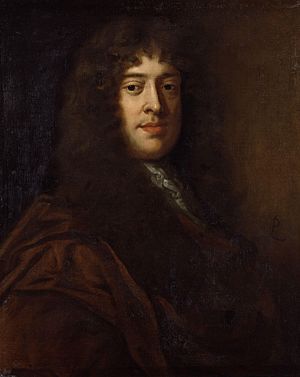William Wycherley facts for kids
William Wycherley (born 1641, died 1716) was an English playwright and poet. He lived during a time in English history called the Restoration period. He is most famous for his plays The Country Wife and The Plain Dealer.
Contents
William Wycherley's Early Life
William Wycherley was born in 1641 near Shrewsbury, in Shropshire, England. His family had a good amount of land and his father worked for a powerful nobleman.
When he was about 15, William was sent to France for his education. While in France, he became a Catholic. He returned to England just before King Charles II became king again. He then studied at Queen's College, Oxford. There, he decided to return to the Church of England.
Wycherley later moved to London and briefly studied law. However, he was more interested in theatre and entertainment. He also served as a soldier in Ireland in 1662. He went on a diplomatic trip to Madrid in 1664-1665. He also said he fought in the Second Anglo-Dutch War in 1665.
His First Plays
William Wycherley loved the stage and writing plays. His first play, Love in a Wood, was performed in 1671 at the Theatre Royal in London. It was published the next year. This play was very popular and made him well-known at the royal court.
His second play was The Gentleman Dancing Master, which was likely performed in late 1671 and published in 1673. Wycherley also served as a soldier during the Third Anglo-Dutch War. He was a captain in the Duke of Buckingham's army in 1672. He resigned in 1674 and returned home.
His Most Famous Plays
Wycherley's most famous plays are The Country Wife and The Plain Dealer.
The Country Wife was performed around 1672 or 1673 and published in 1675. This play is known for its clever humor and lively dialogue. It showed the lives of wealthy people in London at the time. The play was inspired by some plays by the French writer Molière. Wycherley added more everyday language and a fast-paced story to make it appeal to London audiences.
His play The Plain Dealer was based on Molière's Le Misanthrope. It was highly praised by other famous writers like John Dryden.
By 1675, Wycherley's plays had made him a favorite of King Charles II. The King admired his wit and even wanted Wycherley to tutor his son, the Duke of Richmond.
Marriage and Challenges
In 1679, William Wycherley secretly married the Countess of Drogheda. He kept it a secret because he was afraid of losing the King's support and money. However, the King found out and was not pleased. Wycherley lost the King's favor and the chance to be a royal tutor.
The Countess loved him very much. She kept a close eye on him, even when he met friends. She died in 1685 and left him all her money. But there were legal problems over her property, and the lawsuits cost a lot. Wycherley ended up in Fleet Prison because of his debts.
King James II helped him get out of prison. The King enjoyed The Plain Dealer so much that he paid off Wycherley's debts and gave him a yearly payment. In 1689, Wycherley went back to Shropshire. He had some disagreements with his father about money but eventually settled his debts.
Later Years and Legacy
Even after his father died in 1697 and he inherited some family property, Wycherley still had money problems. He took out a mortgage on his land to pay more debts. He continued to live in London.
At 74 years old, and in poor health, William Wycherley married a young woman named Elizabeth Jackson in December 1715. He died shortly after, on January 1, 1716. He was buried in London.
Wycherley's plays were considered very bold for a long time. Because of their language and content, they were often changed or shortened for performances and publications for nearly 200 years.
William Wycherley may have created the word "nincompoop". This word appears in his play The Plain Dealer. He is also cited as the first person to use the phrase "happy-go-lucky" in 1672.
In 1952, the composer Malcolm Arnold turned Wycherley's play The Gentleman Dancing Master into a short opera.
See also
 In Spanish: William Wycherley para niños
In Spanish: William Wycherley para niños


